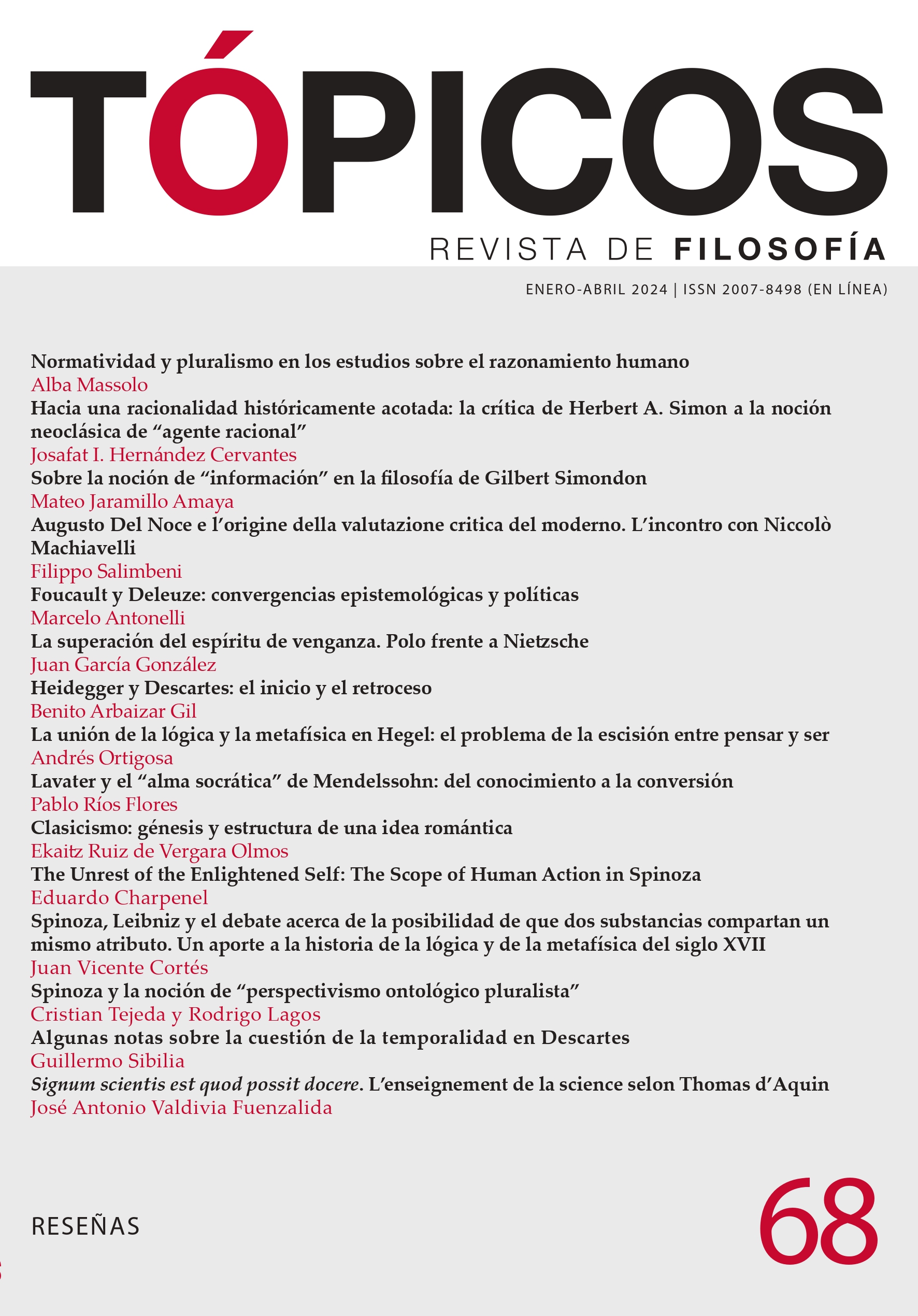Artículos
Publicado 2023-12-07
Palabras clave
- voluntad,
- libertad,
- Nietzsche,
- Heidegger,
- Polo
- venganza,
- causalidad ...Más
Derechos de autor 2023 Tópicos, Revista de Filosofía

Esta obra está bajo una licencia internacional Creative Commons Atribución-NoComercial-SinDerivadas 4.0.
Cómo citar
García González, J. (2023). La superación del espíritu de venganza. Polo frente a Nietzsche. Tópicos, Revista De Filosofía, 68, 153-177. https://doi.org/10.21555/top.v680.2501
Resumen
El análisis de la noción de “espíritu de venganza” permite comparar la voluntad de poder nietzscheana con la libertad trascendental poliana con el fin de ampliar la metafísica con una antropología trascendental. La voluntad de poder supera el espíritu de venganza con el eterno retorno de lo mismo, pero está abocada al nihilismo. La libertad trascendental, por su referencia al futuro, supera el espíritu de venganza de mejor modo, pues se abre a la alteridad intersubjetiva.
Referencias
- Arendt, H. y Heidegger, M. (2000). Correspondencia. 1925-1975. U. Ludz (ed.). A. Kovacsics (trad.). Herder.
- Aristóteles (1982). Metafísica. V. García Yebra (ed.). Gredos.
- Boecio, A. M. (1977). La consolación de la filosofía. P. Masa (trad.). Aguilar.
- Carroll, B. W. y Ostlie, D. A. (2007). An Introduction to Modern Astrophysics. Pearson.
- Carassai, M. (2017). Sp(rache). El bacilo lingüístico de la venganza y la idea de eterno retorno en Nietzsche. A. Rovi Ruíz y M. Parmeggiani (trads.). Estudios Nietzsche, 17, 129-141. DOI: https://doi.org/10.24310/EstudiosNIETen.vi17.10846.
- De Aquino, T. (1952). Suma teológica. II-II. Á. Martínez Casado, D. González, V. Rodríguez Rodríguez, L. López de las Heras y J. M. Rodríguez Arias (trads.). BAC.
- Fink, E. (1960). Nietzsches Philosophie. Kohlhammer.
- Fink, E. (2019). La filosofía de Nietzsche. A. Ciria (trad.). Herder.
- Galparsoro Ruiz, J. I. (2010). Infinito y tiempo en Nietzsche. Ontology Studies, 10, 183-198. URL: https://raco.cat/index.php/Ontology/article/view/245085.
- Gutiérrez, C. (2020). ¿Ha superado Zaratustra el espíritu de venganza? Estudios Nietzsche, 16, 41-54. DOI: https://doi.org/10.24310/EstudiosNIETen.vi16.10815.
- Jaspers, K. (1936). Nietzsche. Einführung in das Verständnis seines Philosophierens. Walter de Gruyter.
- Jaspers, K. (2003). Nietzsche. E. Estiu (trad.). Sudamericana
- Hegel, G. W. F. (1988). Sämtliche Werke. 19. Vorlesungen über die Geschichte der Philosophie. III. Frommann-Holzboog
- Hegel, G. W. F. (2015). Fenomenología del espíritu. M. Jiménez Redondo (trad.). Pretextos
- Heidegger, M. (1991). Ser y tiempo. J. Gaos (trad.). FCE.
- Heidegger, M. (1994). Conferencias y artículos. E. Barjau (trad.). Ediciones del Serbal.
- Heidegger, M. (1996). Gesamtausgabe. I. Abteilung: Veröffentlichte Schriften 1910–1976. 6.1. Nietzsche. I. Klostermann.
- Heidegger, M. (1997). Gesamtausgabe. I. Abteilung: Veröffentlichte Schriften 1910–1976. 6.2. Nietzsche. II. Klostermann.
- Heidegger, M. (2000a). Gesamtausgabe. I. Abteilung: Veröffentlichte Schriften 1910–1976. 16. Reden und andere Zeugnisse eines Lebensweges (1910–1976). Klostermann
- Heidegger, M. (2000b). Gesamtausgabe. I. Abteilung: Veröffentlichte Schriften 1910–1976. 7. Vorträge und Aufsätze (1936-1952). Klostermann.
- Heidegger, M. (2002). Serenidad. I. Zimmerman (trad.). Ediciones del Serbal.
- Heidegger, M. (2005). ¿Qué significa pensar? R. Gabás (trad.). Trotta.
- Kant, I. (1994). Crítica de la razón pura. P. Rivas (trad.). Alfaguara.
- Levinas, E. (1987). Hors sujet. Fata Morgana.
- Levinas, E.(1997). Fuera del sujeto. R. Sanz Torrejón (trad.). Caparrós Editores.
- Nietzsche, F. (1980). Así habló Zaratustra. A. Sánchez Pascual (trad.). Alianza.
- Nietzsche, F. (2008). Fragmentos póstumos. Volumen IV. (1885-1889). D. Sánchez Meca (ed.). J. L. Vermal Beretta (trad.). Tecnos.
- Nietzsche, F. (2010). Fragmentos póstumos. Volumen III. (1882-1885). D. Sánchez Meca (ed.). D. Sánchez Meca y J. Conill (trads.). Tecnos.
- Nietzsche, F. (2019). Humano, demasiado humano. M. Parmeggiani (trad.). Tecnos.
- Ortega y Gasset, J. (1958). Historia como sistema. Revista de Occidente.
- Oyarzún Montes, L. F. (2010). Nietzsche y la redención de la venganza. A partir de Así habló Zaratustra y otros textos. [Tesis de maestría]. Universidad de Chile.
- Polo, L. (2015a). Obras completas. III. El ser. I. Existencia extramental. EUNSA.
- Polo, L. (2015b). Obras completas. XIII. La persona humana y su crecimiento. EUNSA.
- Polo, L. (2015c). Obras completas. XXIV. Estudios de filosofía moderna y contemporánea. EUNSA.
- Polo, L. (2016a). Obras completas. X. Quién es el hombre. Presente y futuro del hombre. EUNSA.
- Polo, L. (2016b). Obras completas. XV. Antropología trascendental. EUNSA.
- Polo, L. (2017). Obras completas. XIX. Persona y libertad. EUNSA.
- Polo, L. (2018). Obras completas. XVII. Nietzsche como pensador de dualidades. EUNSA.
- Polo, L. (2022a). Obras completas. XXX. Artículos y conferencias. EUNSA.
- Polo, L. (2022b). Obras completas. XXXII. Glosas a Nietzsche. EUNSA.
- Rojas Jiménez, A. (2009). La cuadratura. La última palabra del pensamiento ontológico de Heidegger. Universidad de Málaga.
- Rojas Jiménez, A. (2014). Das Potenzlose. Die Spur Schellings in der Spätphilosophie Heideggers. Olms.
- Van Alan, H. (2003). The Concept of Ungrund in Jakob Boehme. (1575-1624). [Tesis de maestría, The University of Oklahoma]. ShareOK. URL: https://hdl.handle.net/11244/329740.
- Vermal Beretta, J. L. y Bautista Llinares Chover, J. (2016). Introducción. En F. Nietzsche, Fragmentos póstumos. Volumen IV. (1885-1889). (pp. 11-34). D. Sánchez Meca (ed.). J. L. Vermal Beretta y J. Bautista Llinares Chover (trads.). Tecnos.





